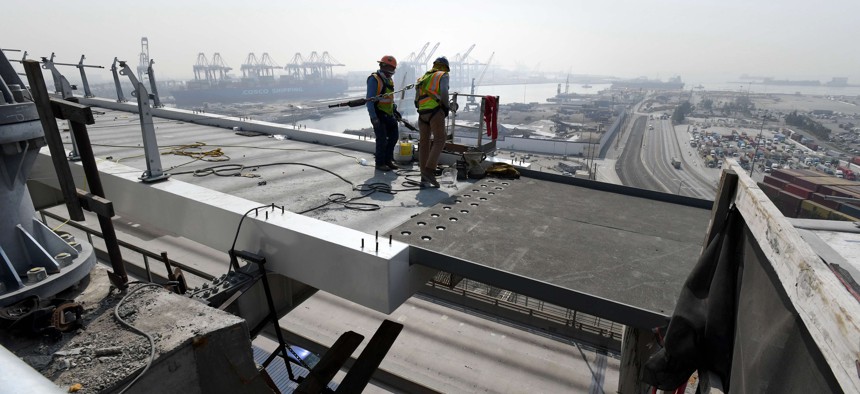Biden Administration Awards $2.2B in Transportation Grants

Crews worked in September 2020 to get the Gerald Desmond Bridge Replacement Project closer to its grand opening in Long Beach, California. By Brittany Murray/MediaNews Group/Long Beach Press-Telegram via Getty Images
The “RAISE” grants will go to dozens of projects around the U.S., and mark one of the first major releases of discretionary funding from the new infrastructure law.
Americans are getting one of their first glimpses of major new spending under last year’s federal infrastructure law, as the Biden administration on Thursday announced 166 major projects across the country that will receive federal funds.
All told, the administration is handing out $2.2 billion in so-called RAISE (Rebuilding American Infrastructure with Sustainability and Equity) grants this year. That’s a substantial increase over the $1 billion it distributed last year through the same program, because of a big boost that came as part of the infrastructure law.
“We recognize that the solutions don’t all have to come from Washington, but more of the funding should, and that’s what this program is doing,” Transportation Secretary Pete Buttigieg told reporters Wednesday.
“Even with the more than doubled funding this year, we still had many more good ideas come in than we have dollars available,” he said. But, Buttigieg added, “we are able to say yes more often for great projects, getting them off of the drawing board and in the ground, out in the communities where they're going to save people time and money.”
The RAISE grants were the first discretionary grant program the Biden administration accepted applications for under last year’s $1.2 trillion Infrastructure Investment and Jobs Act. So Thursday’s announcement was one of the administration’s first chances to show how it plans to distribute the new money.
Individual projects got grants of up to $25 million to improve connections among different transportation modes, or to improve handling of freight.
The Biden administration said nearly two-thirds of projects are located in areas of persistent poverty or historically disadvantaged communities. Eleven of the 166 projects included a local-hire provision, something the department encouraged in its notice of funding opportunity.
The RAISE grants are the latest incarnation of the popular competitive program previously known as TIGER during the Obama years and BUILD during the Trump administration.
Each administration has put its own stamp on the program. Under the Obama administration, for example, between 61% and 92% of the grants went to urban areas. That dropped to about a third in the first two years of the Trump administration, according to a 2019 analysis by Transportation for America.
This year, the split between urban and rural areas was even, according to U.S. Department of Transportation officials.
Administration officials also touted the workforce development aspects of several recipients. Four of the projects have project labor agreements, eight use registered apprenticeship programs and another eight projects use other workforce development components.
Buttigieg is scheduled to tout the grants during a trip to Arizona Thursday, where he will visit Tucson and Phoenix. Tucson received money to build a new bridge over a rail line, which will increase the road’s capacity. The project includes a separate bridge for pedestrians and cyclists, along with conduit for broadband. Phoenix received $25 million to build a bicycle and pedestrian bridge across the Salt River.
Mitch Landrieu, Biden’s infrastructure coordinator, is traveling to Atlanta to announce funding for renovations at the Five Points bus and subway station. The $25 million will be used for the above-ground portion of a major renovation at the transit hub, which will make it easier for passengers to transfer and include improvements to a public plaza.
Among the other grants the Transportation Department awarded are:
- Planning money for California high-speed rail to Merced,
- Construction of a bike and pedestrian bridge between Virginia and Washington, D.C.,
- A new berth for Tampa’s port facility
- Measures to prevent pedestrian deaths along Florida’s Brightline railway
- A new cargo storage area in Texas
- Waterfront revitalization in the Virgin Islands
- The replacement of a 60-year-old ferry in Washington state with an electric-battery hybrid ferry
- The construction of 28 bridges in western North Carolina to avoid closures caused by flooding and
- Paved roads to replace a stretch of gravel lanes on the Northern Cheyenne Reservation in Montana.
South Bend, Indiana, where Buttigieg once served as mayor, received $2.4 million to help with planning for removing freeway ramps that cut off an area of the city from amenities like grocery stores, a farmer’s market, housing, a middle school and parks, according to the Transportation Department.
While New Orleans, where Landrieu once was mayor, did not receive any grants in this round of funding, two train stations in Baton Rouge did. The new stations are part of an effort to bring passenger rail service between Baton Rouge and New Orleans.
Local officials expressed excitement at receiving the federal funding.
"I’ve been out in the community, listening to your concerns about making our streets safer," Cincinnati Mayor Aftab Pureval tweeted, "and it’s investments like this that will help us reach our goals."
Daniel C. Vock is a senior reporter for Route Fifty based in Washington, D.C.
NEXT STORY: With a Big Surge in Transportation Funding, a State Decides Its Spending Priorities






